10 Best WordPress E-Commerce Hosting (2025)
| Hosting Provider | Reviews | Overall Rating | Starts from |
|---|---|---|---|
1  HostArmada HostArmada
|
1k+ |

|
$1.49 / mo. NOW -80% |
2  SiteGround SiteGround
|
23.3k+ |

|
$3.41 / mo. NOW -81% |
3  Hostinger Hostinger
|
47.8k+ |

|
$1.95 / mo. 75% Off |
4  HostPapa HostPapa
|
2.5k+ |

|
$1.00 / mo. -77% OFF |
5  DreamHost DreamHost
|
7k+ |

|
$1.67 / mo. Flash Sale |
6  InMotion Hosting InMotion Hosting
|
2.5k+ |

|
$0.99 / mo. -75% |
7  Ultahost Ultahost
|
656 |

|
$1.80 / mo. Flash Sale -40% |
8  Contabo Contabo
|
6.4k+ |

|
$4.73 / mo. No Setup Fee |
9  FastComet FastComet
|
3k+ |

|
$1.79 / mo. -80% OFF |
10  A2 Hosting A2 Hosting
|
3.4k+ |

|
$1.95 / mo. NOW -76% |
1. HostArmada


 1k+
1k+
 4.9
Positive
4.9
Positive
 Positive
Positive

HostArmada - Speed Oriented Cloud SSD Hosting
Pros- Competitive starting and renewal prices
- Excellent uptime and performance with SSD storage
- Generous 45-day money-back guarantee
- Easy scalability for growing websites
- Effective 24/7 customer support
- Newer on the market, with a lesser-known brand
- High-performance plans can become pricey
HostArmada has made a significant impact on the hosting market, offering a variety of hosting services tailored for both beginners and seasoned webmasters. This relatively new provider distinguishes itself with its emphasis on security and performance, coupled with competitive pricing. For those concerned about long-term costs, it's worth noting that their renewal prices keep the affordability in check, ensuring you're not caught off guard after the initial term.
What sets HostArmada apart is its commitment to providing a reliable and fast hosting environment. This is achieved through the use of cutting-edge technology like SSD storage across all plans, ensuring quick data retrieval and high uptime. With data centers strategically located around the globe, users can expect consistent performance irrespective of their geographic location.
HostArmada's basic plan includes 15 GB of SSD storage, 2 GB RAM, and unlimited bandwidth, making it a strong starting point for small to medium-sized websites. As your site grows, upgrading is straightforward, offering scalability to more resource-intensive plans without hassle. Additionally, they offer a 45-day money-back guarantee, giving you ample time to test their services risk-free.
Customer support is another area where HostArmada shines. Their 24/7/365 customer service ensures that help is always just a ticket or a phone call away. Whether it's setting up your site or addressing any technical issues, you can expect a prompt and helpful response.
Choosing HostArmada could be a smart move for anyone looking for a combination of affordability, reliability, and excellent support. The inclusive features make it suitable for a diverse range of websites, from personal blogs to more demanding e-commerce platforms.
2. SiteGround


 23.3k+
23.3k+
 4.8
Positive
4.8
Positive
 Positive
Positive
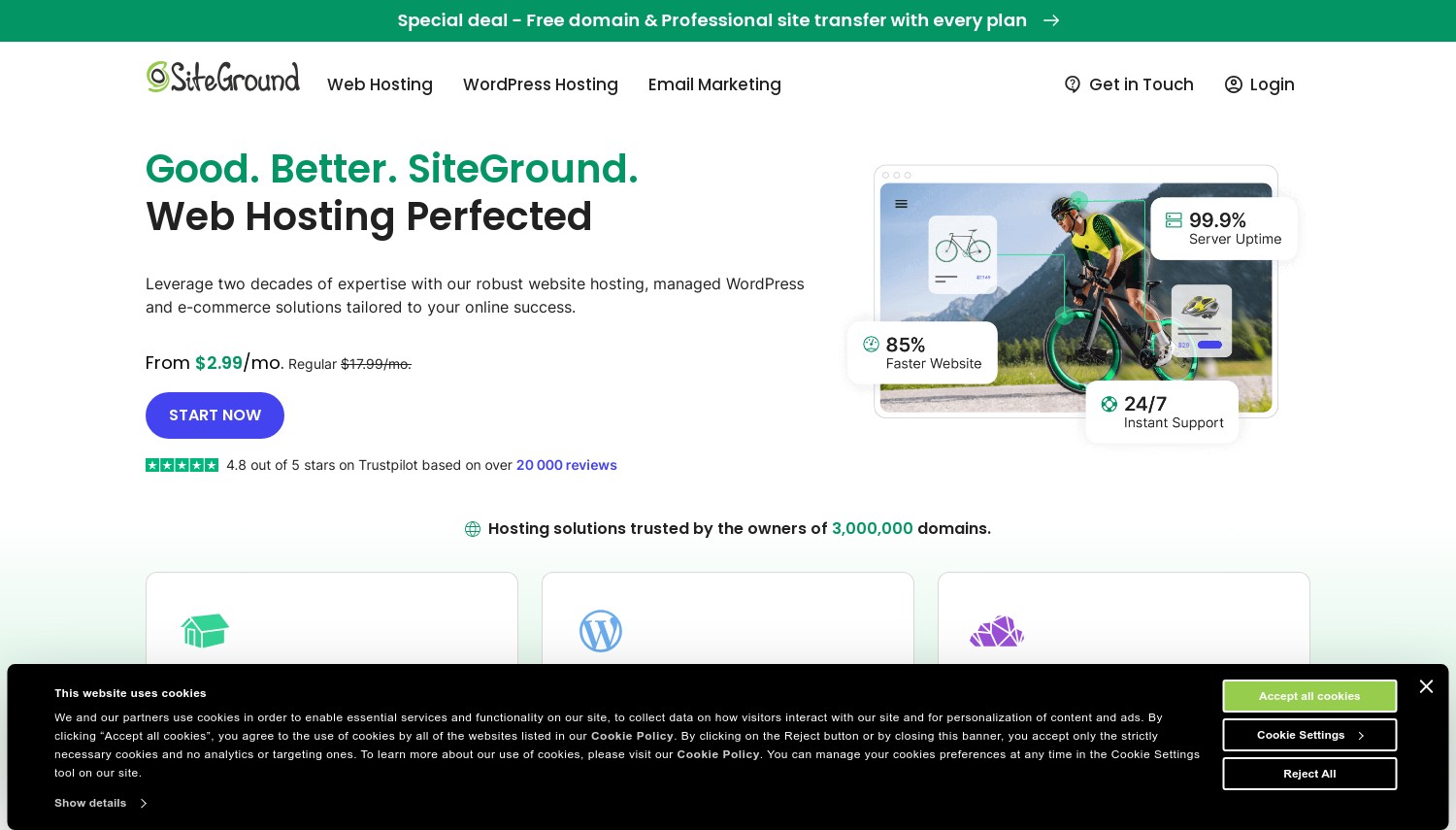
SiteGround - High Performance & Easy Site Management
Pros
- Best WordPress support team, good uptime, fast speed, and free SSL.
- Free Site Migration
- Managed WooCommerce hosting powered by the Google Cloud platform with automatic backups (daily) and enhanced security firewall.
- Comes pre-installed with the WooCommerce plugin, and access to powerful SEO tools like AIOSEO and other helpful plugins such as WPForms, and OptinMonster.
Cons
- No free domain, and the GoGeek Plan is slightly expensive considering the market average.
SiteGround makes it possible for everyone from startups to established businesses to take advantage of its cutting-edge technology. The hosting platform is built on Google Cloud, ensuring a powerful and reliable infrastructure. For those concerned about pricing after the promotional period, renewal prices begin at a competitive rate, offering a balance of affordability and value.
Each plan under SiteGround's umbrella boasts an array of features designed to maximize website performance and security. Customers can expect anywhere from 10GB to 40GB of web space on SSD storage, ensuring quick data retrieval and smooth website operation. Data transfer is seamless, thanks to unmetered traffic, and the uptime guarantee signifies reliability. With the integration of free SSL certificates and daily backups, your online store's safety and data integrity are never in question.
Choosing SiteGround for your WooCommerce store means gaining access to a host that prioritizes speed and security. The company's proprietary SuperCacher technology and custom PHP setup work in tandem to provide lightning-fast loading times. This makes SiteGround an ideal choice for those aiming to enhance user experience and SEO rankings. Additionally, the inclusion of a free Content Delivery Network (CDN) ensures your website's responsiveness across the globe.
For those cautious about committing, SiteGround offers a 30-day money-back guarantee. This assurance allows users to test the service risk-free, ensuring it meets their specific needs and expectations.
Ultimately, SiteGround distinguishes itself through a harmonious blend of technology, support, and features tailored for WooCommerce stores. Whether it's the ease of starting a new store with pre-installed WooCommerce and relevant tools, or the peace of mind from round-the-clock support and robust security measures, SiteGround provides a comprehensive hosting solution. This makes it an appealing choice for eCommerce ventures of all sizes, balancing cost-effectiveness with a broad spectrum of eCommerce-focused functionalities.
3. Hostinger


 47.8k+
47.8k+
 4.6
Positive
4.6
Positive
 Positive
Positive

Hostinger - Affordable Prices with Premium Features
Pros:- Fast and reliable hosting with uptime guarantees.
- Free domain name and SSL certificate across plans.
- Automatic backups and DDoS protection for enhanced security.
- User-friendly control panel for easy management.
- 24/7 customer support via chat and email.
- Higher renewal prices after the introductory period.
- No phone support available.
Hostinger provides a range of hosting services including shared hosting, cloud hosting, and VPS hosting, tailored to meet various needs and budgets. This pricing strategy makes Hostinger a go-to choice for users looking for a balance between cost and performance.
The entry-level shared hosting plan includes 30 GB of SSD storage, 100 GB bandwidth, and support for a single website, making it an optimal starter pack for new websites. For more demanding sites, Hostinger's VPS and cloud hosting plans offer increased resources, such as more RAM, SSD space, and bandwidth, to comfortably handle higher traffic volumes and more complex website operations.
A standout feature of Hostinger is its 30-day money-back guarantee, which provides a risk-free way for users to test their hosting services. This assurance reflects confidence in their hosting solutions and customer satisfaction.
Choosing Hostinger as your hosting provider comes with the benefit of optimized performance. Their servers, powered by LiteSpeed and equipped with integrated caching solutions, ensure fast loading times crucial for website efficacy and SEO. The availability of data centers in various geographic locations further enhances site speed and user experience across the globe.
However, an important consideration is the higher renewal rates after the initial term, which is a common practice in the hosting industry. Users should weigh the initial cost savings against the long-term expense when planning their hosting budget.
4. HostPapa


 2.5k+
2.5k+
 4.8
Positive
4.8
Positive
 Positive
Positive
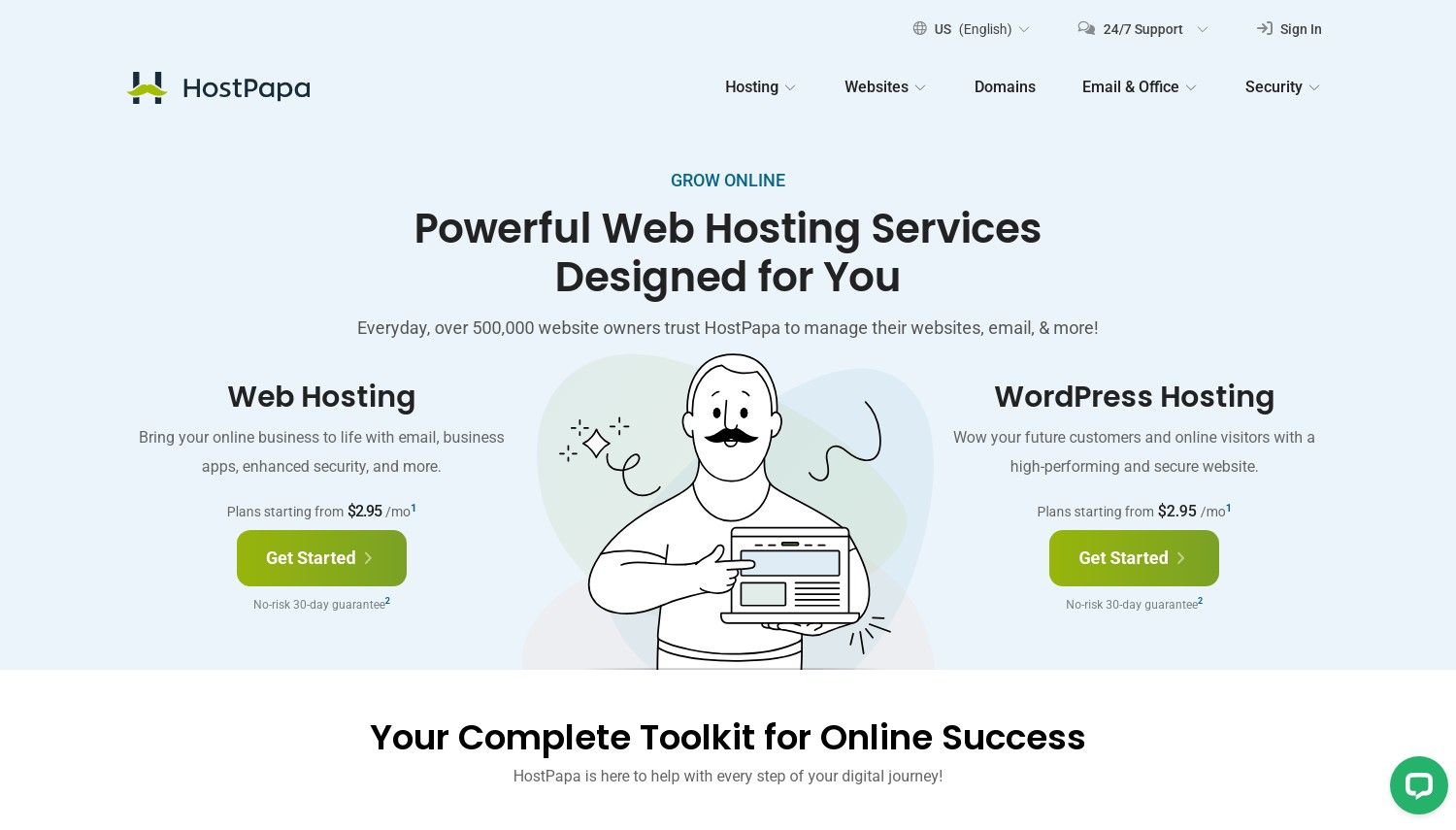
HostPapa - User-Friendly Solutions for Small Businesses
Pros- Eco-friendly hosting solutions
- User-friendly interface and tools
- Free domain registration and transfer
- 24/7 support and 30-day money-back guarantee
- Renewal rates are higher than the introductory price
- Limited advanced features for larger business needs
HostPapa stands as a reputable web hosting solution, boasting an intuitive interface and services tailored to meet the needs of small to medium-sized businesses. HostPapa makes an appealing offer, especially for those just stepping into the online world. This introductory rate covers a broad spectrum of features such as 100 GB of SSD storage, unmetered bandwidth, and free domain registration, catering to both newcomers and established webmasters alike. However, it's worth noting that upon renewal, the price jumps slightly, making it crucial for potential users to weigh the long-term cost against the initial savings. Moreover, HostPapa offers a 30-day money-back guarantee, providing a safety net for those testing the waters.
One of the most significant advantages of opting for HostPapa is its commitment to providing a user-friendly experience, complete with a comprehensive suite of tools designed to streamline website management. This includes access to a website builder, one-click WordPress installs, and a 24/7 support team ready to assist with any inquiries or issues that may arise. Furthermore, HostPapa makes a conscious effort to deliver eco-friendly hosting solutions, utilizing green energy to power their servers, which not only benefits your website but also contributes to a healthier planet.
Choosing HostPapa as your web hosting provider means getting behind a service that not only aims to ensure your website performs optimally but also takes steps to minimize its environmental impact. The blend of affordability, support, and green hosting solutions makes HostPapa a smart choice for those looking to establish or grow their online presence while maintaining a commitment to sustainability.
5. DreamHost


 7k+
7k+
 4.6
Positive
4.6
Positive
 Positive
Positive

DreamHost - Reliable, Independent Hosting Services
Pros
- Competitive pricing with a broad range of plans to suit various needs and budgets
- Free domain name registration with privacy protection on all plans
- Extensive WordPress integration with easy migration, staging, and SEO tools
- Environmentally responsible hosting with a commitment to carbon neutrality
Cons
- Limited server locations, primarily in the U.S., which might affect global site performance
- Some users might find the custom control panel less intuitive than cPanel
- No telephone support, with assistance mainly provided through chat and email
DreamHost offers an attractive entry point for startups and small businesses -DreamHost ensures affordability without compromising on quality. The managed WordPress hosting solutions cater to a more sophisticated online presence with enhanced maintenance and performance optimization services. Notably, some plans also offer a renewal price, ensuring long-term savings for committed users.
Why should one opt for DreamHost? Beyond competitive pricing, DreamHost provides a 100% uptime guarantee -a bold claim that underscores its reliability. For WordPress users, the ease of one-click installations, pre-configured settings, and access to a suite of powerful SEO and growth tools make for a compelling package. DreamHost also prioritizes security and privacy, offering free SSL certificates and domain privacy to protect user information and transactions.
A distinctive feature of DreamHost is its commitment to customer satisfaction, highlighted by its generous refund policy. The shared hosting plans come with an unprecedented 97-day money-back guarantee, allowing users to test the waters with confidence. Also, DreamHost's VPS and dedicated server plans offer scalability and robust performance for growing sites, ensuring that businesses can expand without fearing bandwidth or storage limitations.
6. InMotion Hosting


 2.5k+
2.5k+
 4.0
Positive
4.0
Positive
 Neutral
Neutral
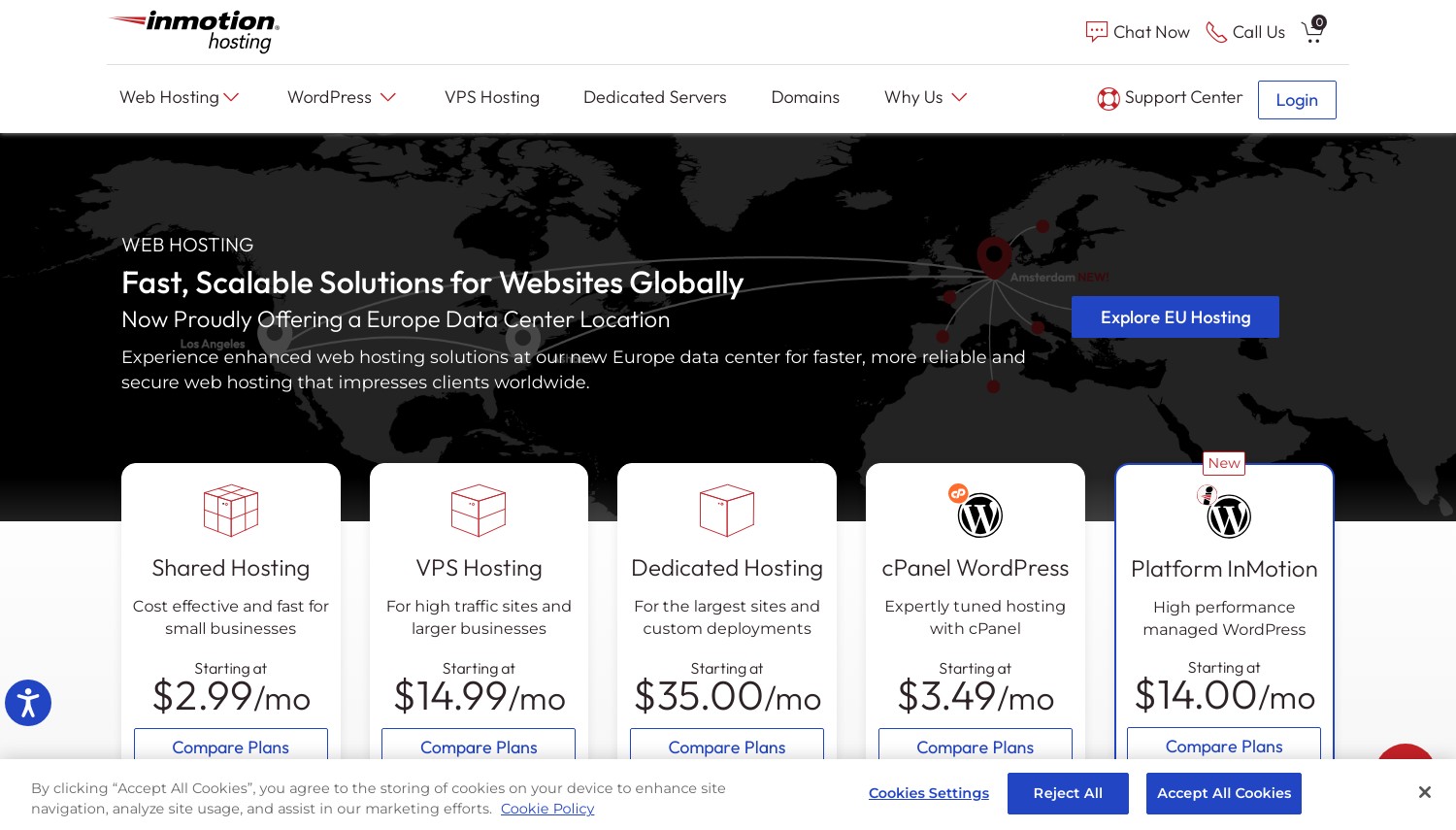
InMotion Hosting - Versatile Hosting with Great Support
Pros- Excellent uptime and reliability
- Free site migration and a wide array of WordPress-specific features
- Unlimited email and monthly data transfers on all shared and WordPress plans
- Generous 90-day money-back guarantee
- User-friendly website-building tools
- Lacks Windows server options
- Not all plans offer month-to-month payment options
- Higher renewal prices post the initial term
InMotion Hosting offers comprehensive solutions that cater to various hosting needs, from personal blogs to large-scale business websites. With pricing starting at $6.99 per month for the initial period and renewal rates at $14.99 per month for the WP Launch plan, InMotion stands out for its balance between affordability and robust hosting capabilities. This plan is suitable for small to medium-sized WooCommerce sites, providing essential features such as unlimited email and monthly data transfers, which are crucial for businesses expecting fluctuating website traffic. Furthermore, users benefit from $150 worth of advertising credits, enhancing the visibility of newly launched sites.
For those with growing needs, the WP Power plan matches increased demand with enhanced capabilities. This option doubles the email storage per inbox and supports significantly higher traffic volumes, making it an ideal choice for expanding online stores or blogs.
InMotion doesn't stop at shared hosting. For enterprises and websites that are scaling rapidly, it offers VPS hosting solutions that deliver more power, storage, and flexibility. This versatility ensures that InMotion can grow with your website, offering solutions that range from beginner-friendly to enterprise-grade, all backed by a 90-day money-back guarantee, which is one of the longest in the industry.
Choosing InMotion Hosting means investing in reliable uptime, easy WordPress integrations, and excellent customer service. The inclusion of the free BoldGrid website builder and over 200 free themes simplifies the site-building process, making it accessible even to novices. However, it's important to note that InMotion lacks Windows server options, which might be a consideration for those requiring specific Windows-based applications.
7. Ultahost


 656
656
 4.6
Positive
4.6
Positive
 Positive
Positive
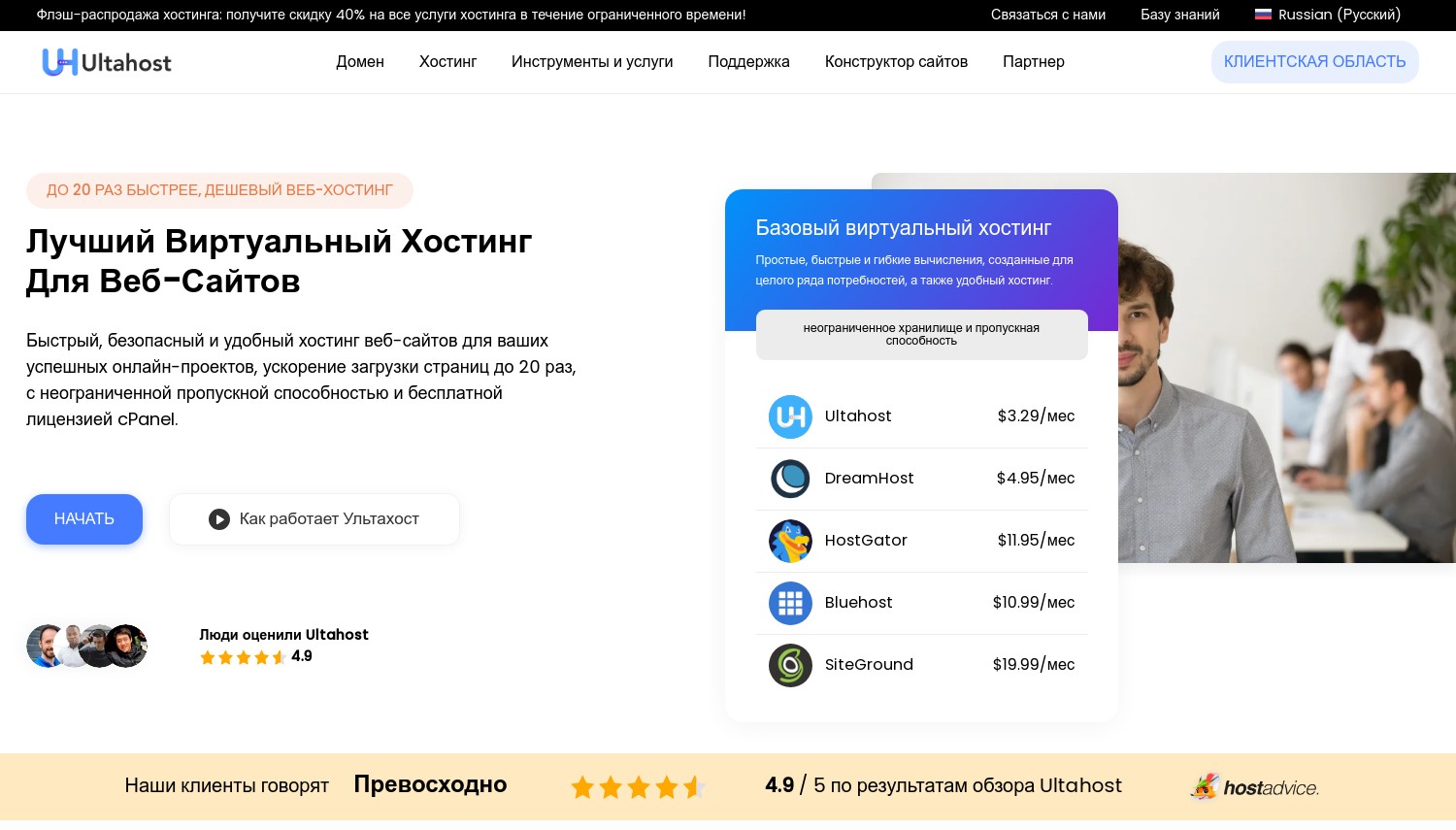
Ultahost - High-Performance VPS Hosting
Pros
- Competitive pricing structure starting at $3.29, with clear indications of renewal rates.
- Generous hosting resources even at entry-level plans.
- 30-day money-back guarantee provides a risk-free testing period.
- High-performance servers equipped with NVMe SSDs for enhanced speed.
Cons
- Lack of Windows server options, which might be a drawback for specific applications.
- While user-friendly, the platform's features and options can be overwhelming for absolute beginners.
One of the key aspects that make Ultahost an attractive option for personal and small business websites is its comprehensive hosting packages, which include VPS, shared, dedicated, and even specialized hosting such as WordPress and WooCommerce. The entry-level plan comes with 30 GB SSD storage, 1 TB bandwidth, and 1 GB RAM, which is quite generous for the price. Additionally, the company also mentions renewal prices transparently, which helps in making long-term hosting decisions.
Understanding the importance of flexibility and peace of mind for its users, Ultahost offers a 30-day money-back guarantee. This feature is crucial for those who are experimenting with their online presence and prefer a safety net in case the service doesn't meet their expectations. Furthermore, Ultahost takes pride in its state-of-the-art infrastructure that ensures high uptime and performance stability, promising an environment where websites can thrive.
Choosing Ultahost could be a smart move for users primarily because of its attractive balance between cost and value. The hosting provider caters to a wide range of needs from basic to complex site requirements. It's also user-friendly, making it accessible for those with little to no technical background. However, what makes Ultahost stand out is its focus on using cutting-edge technology like NVMe SSDs in all its servers, ensuring quick loading times and smooth operation for all hosted sites, regardless of the traffic they receive.
8. Contabo


 6.4k+
6.4k+
 4.0
Positive
4.0
Positive
 Positive
Positive
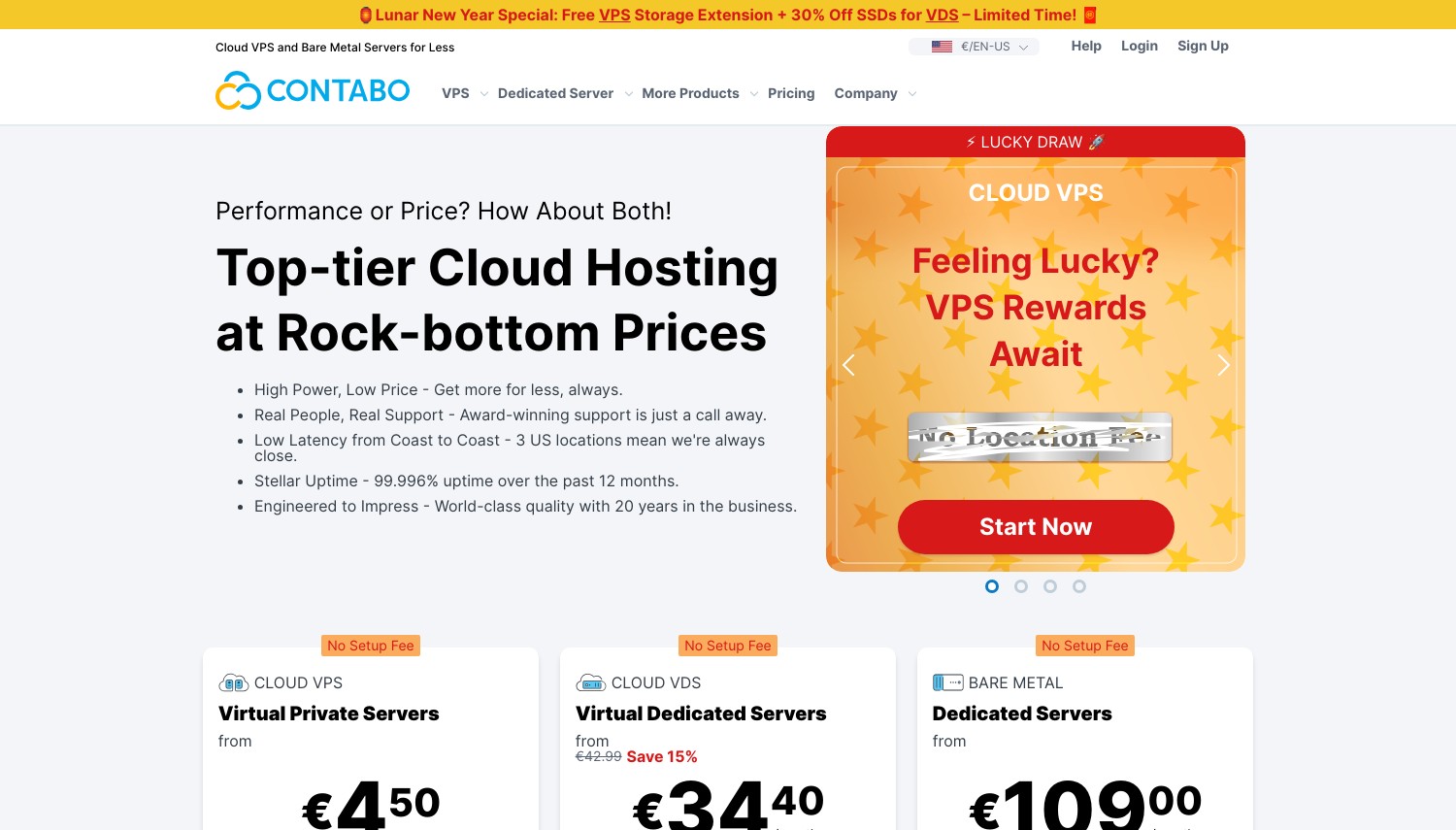
Contabo - Feature-Rich Web Hosting with Flexibility
Pros- Affordable pricing for the resources offered.
- Wide selection of data centers across the globe.
- Highly customizable hosting solutions.
- Excellent performance and reliability.
- Lacks a money-back guarantee.
- Renewal prices can be high.
- User interface could be challenging for beginners.
Contabo is well-regarded for offering competitively priced web hosting services, making it a strong contender for both small and medium-sized enterprises. With pricing starting at around $3.99/month for its Web Space Package L, users can enjoy 50 GB of SSD storage, unlimited traffic, and the ability to host multiple websites, which is quite a bargain. For those looking for more power and resources, Contabo offers VPS and dedicated server options, with the price of VPS solutions starting from approximately $6.99/month for 4 CPU Cores, 8 GB RAM, and 50 GB SSD space. It's important to note that while initial prices are appealing, renewal costs can climb, so users should consider long-term expenses.
One of the major draws for Contabo is its broad selection of data centers located in Europe and the U.S., promoting faster website loading times for a global audience. This, along with their promise of a 99.9% uptime, makes Contabo an attractive option for businesses targeting an international market. For those hesitant to commit, there's some disappointment since Contabo does not offer a money-back guarantee, which is a downside for users looking for a risk-free trial. However, the company compensates for this with their excellent customer support and comprehensive documentation.
The platform leans towards users with a fundamental understanding of web hosting, as it provides extensive customization options and control over hosting environments. This makes it ideally suited for developers or businesses with access to IT support. Despite these advantages, Contabo's interface and website might not be the most intuitive for novices, potentially complicating the setup process for those with limited technical expertise.
9. FastComet


 3k+
3k+
 4.8
Positive
4.8
Positive
 Positive
Positive
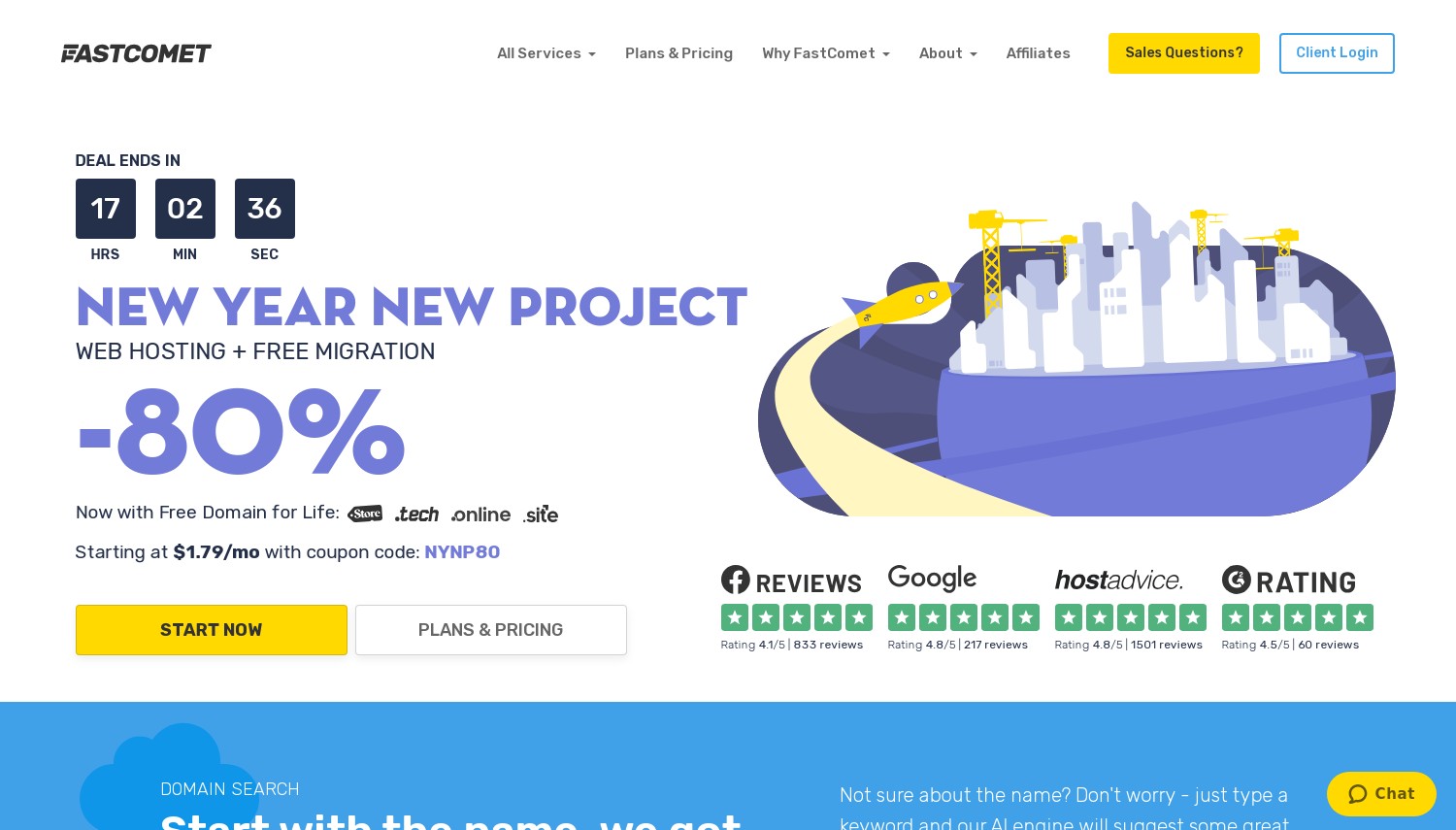
FastComet - Fully Managed Hosting with Global Reach
Pros- Affordable pricing with a 45-day money-back guarantee
- High-performance SSD cloud hosting for faster website speed
- Free Cloudflare CDN integration for improved global page load times
- Comprehensive security features including free SSL, daily backups, and server security
- 24/7 support through various channels including live chat, email, and phone
- Rates increase upon renewal, though they remain competitive
- A broad array of features might be overwhelming for beginners
FastComet is a web hosting provider that has been gaining popularity for its affordable and feature-rich hosting solutions. FastComet offers an array of hosting plans, including shared hosting, cloud VPS hosting, and dedicated servers, catering to various hosting needs and preferences. For those concerned about future expenses, the renewal prices retain their competitive edge, ensuring long-term affordability.
One of the standouts of FastComet's services is its focus on performance and speed. Utilizing SSD-only cloud hosting ensures faster access to files and databases compared to traditional HDDs. Furthermore, FastComet incorporates Cloudflare CDN, which significantly enhances website loading times for a global audience by storing content on multiple servers worldwide.
In addition to performance, FastComet places a high emphasis on security with free Let's Encrypt SSL certificates for securing websites, daily and weekly backups for data safety, and BitNinja server security for all-around defense against cyber threats. Coupled with 24/7 support and a comprehensive 45-day money-back guarantee, FastComet positions itself as a reliable hosting choice for both novice and experienced website owners.
Choosing FastComet could be particularly beneficial for users seeking a balance between affordability, features, and service quality. Whether you are launching a new website, blog, or online store, FastComet provides a robust foundation with its fast, secure, and user-friendly hosting solutions.
10. A2 Hosting


 3.4k+
3.4k+
 4.5
Positive
4.5
Positive
 Positive
Positive
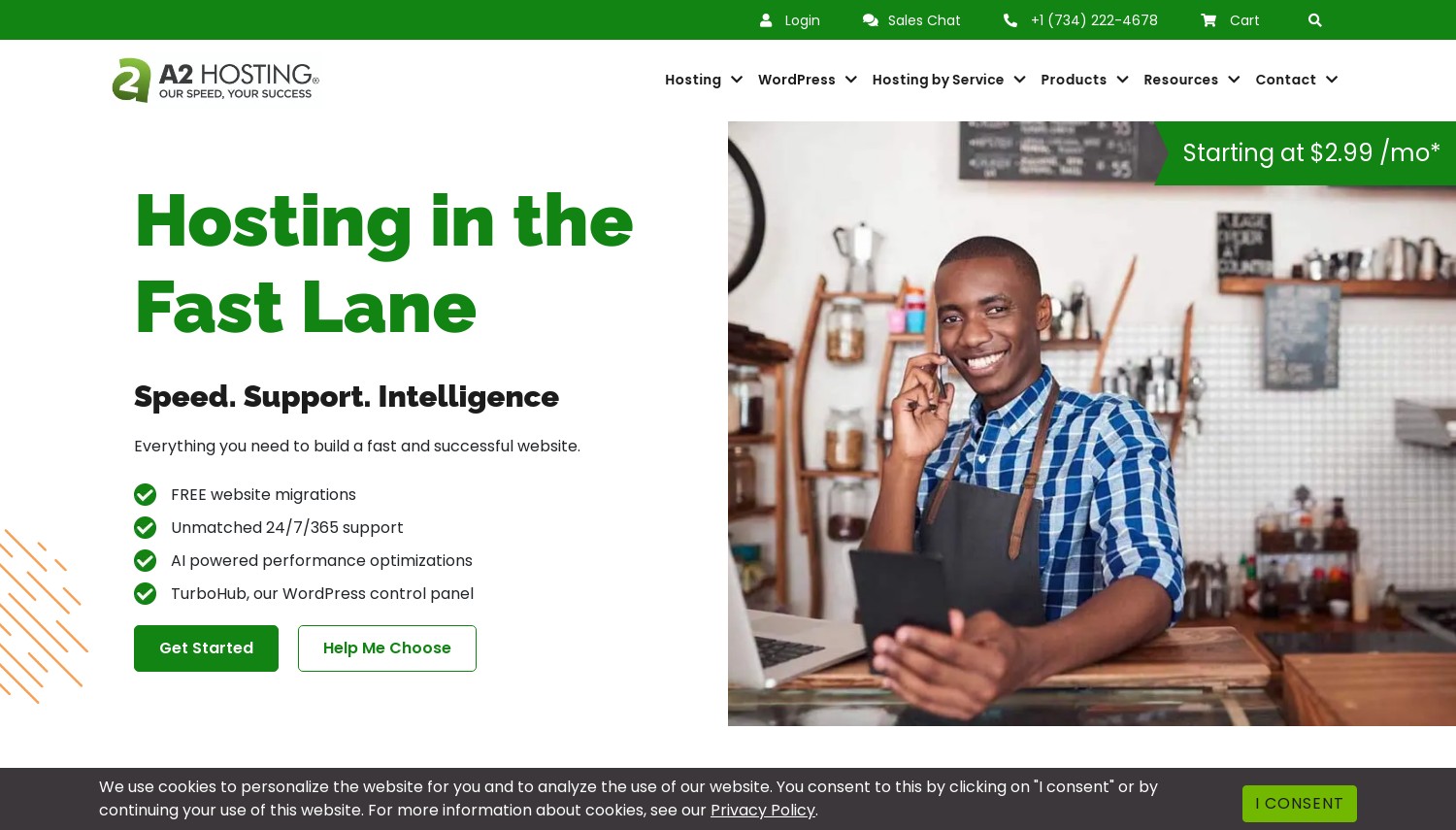
A2 Hosting - High-Speed Solutions for Every Need
Pros- Exceptional speed with LiteSpeed servers
- Free and easy site migration
- 99.9% uptime guarantee
- 24/7/365 customer support
- Eco-friendly hosting solutions
- Plan pricing can be somewhat confusing with many tiers
- Renewal rates are significantly higher than the initial promotional pricing
- Limited Windows server options
Known for its incredible speed and robust support system, A2 Hosting offers various plans tailored to meet the needs of different users, from beginners to seasoned webmasters. With pricing that starts at an affordable $2.99 per month when billed annually, A2 ensures that high-speed hosting is accessible to a wide audience. This entry-level price gives users the opportunity to enjoy the LiteSpeed servers, renowned for their rapid response times and efficient handling of web traffic.
At the core of A2 Hosting's offerings are the managed WordPress plans, which are highly optimized for speed and security. The company underscores the importance of reliable performance with a commitment to 99.9% uptime, translating to minimal downtime annually. Also, A2 is acclaimed for its user-friendly site migration. Transitioning to A2 Hosting is hassle-free, with expert assistance available to ensure a smooth transfer process, emphasizing their understanding of the potential challenges and technical hurdles associated with site migration.
For those concerned about long-term investments, A2 Hosting distinguishes itself with a transparent renewal pricing strategy. The 'run' plan, for instance, renews at about $22.99 per month after the initial period. This approach provides users with clear expectations regarding future costs, thereby facilitating better budget planning. Furthermore, the hosting service encompasses a money-back guarantee, offering a risk-free opportunity for users to test its features and customer support.
Why choose A2 Hosting? It's not just about the speed and the secure servers. It's also about the peace of mind that comes with knowing your site is hosted on an eco-friendly platform that values customer satisfaction and support just as much as it does performance.
HowToHosting.Guide Selected HostArmada Reviews
 Google User
Google User
 Trustpilot User
from Vietnam
Trustpilot User
from Vietnam
 Trustpilot User
from Czech Republic
Trustpilot User
from Czech Republic
Choosing the Best WordPress E-commerce Hosting: Must-Know Tips
Identifying the ideal WordPress hosting for your e-commerce site is crucial for ensuring smooth performance and a secure shopping experience for customers. Here are essential tips to guide you through the selection process:
- Evaluate Your Store's Size and Traffic: Start by assessing the scale of your online store and expected traffic. This will help you determine the level of resources you need. Remember, as your store grows, you might need to upgrade for additional bandwidth and storage.
- Consider Your Budget: Hosting services offer a wide range of pricing. Factor in not just the immediate cost of the hosting plan, but also potential expenses for extras like premium themes, plugins, or add-ons that can enhance your eCommerce site.
- Check Performance and Uptime: For an e-commerce site, every second counts. Look for hosting providers that promise stellar performance, including fast load times and high uptime guarantees, crucial for keeping your site accessible round the clock.
- Assess the Level of Technical Support: The quality of customer support is paramount, especially if you're not technically inclined. Opt for a host that offers responsive, 24/7 support to tackle any issues swiftly.
- Security Measures: Safeguarding customer data is non-negotiable. Ensure the hosting provider includes robust security features such as SSL certificates, regular backups, and malware scanning.
- Scalability: Look for hosting options that allow you to scale resources up or down based on your site's performance and traffic fluctuations. This ensures your site remains efficient and cost-effective.
By keeping these tips in mind, you can narrow down your choices and select a WordPress e-commerce hosting service that aligns perfectly with your business needs and budget, setting a strong foundation for your online store's success.
